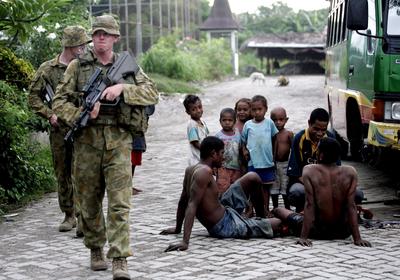Following successful elections in 2007, and an increasing return to stability after the near fatal shooting of Timor-Leste President José Ramos-Horta in early 2008, there have been calls for the Australian-led International Stabilisation Force (ISF) to leave Timor-Leste. The question that has in turn arisen is what sort of security relationship, if any, should Australia construct with Timor-Leste after the departure of the ISF? Particularly considering the numerous challenges Timor-Leste continues to face as a relatively newly independent state.
Among the destabilising factors that continue to inform Timor-Leste are (often unrealistic) social expectations (that exceed the capacity of the government), widespread poverty and an only marginal improvement in living standards. Elite competition for control of limited resources within a framework of patron–client relations, and set against a continuing sense of social trauma and dislocation, also remain destabilising influences.
Also contributing to a sense of social alienation from the state are: near total reliance on oil-based income and the resultant lack of non-oil economic development; increasing corruption; an ineffective judiciary; poorly trained police; and limited government service beyond the few major urban areas. A decentralisation program that was to have addressed many of these issues is currently running two years behind schedule and is now not scheduled to be implemented until 2014, if then. Finally, Timor-Leste’s population continues to grow at an unsustainable (if somewhat declining) rate. Set against this, there continues to be a view within the Timor-Leste Defence Force that it is the final arbiter of state security.
Having noted these negatives, the period between 2010 and 2020 will see a transition in the political leadership of Timor-Leste from the generation that cut its teeth on the initial bid and the subsequent struggle for independence to a younger, better educated generation. The critical questions concerning political transition are: the capacity of new political leaders to continue to develop policies that help foster national identity, assisted by Timor-Leste’s continuing, relatively successful, consolidation of democracy, with elections scheduled for 2012 and 2017; Timor-Leste’s economic growth and the distribution of that growth; the standardisation and implementation of rule of law mechanisms; and the proposed process of decentralisation.
Australia’s best chance of maintaining a stable political presence in Timor-Leste is through the creation, maintenance and enhancement of stability and self-determination.
The increasing assertiveness and almost certain expansion of China’s ‘soft power’ approach toward Timor-Leste (and the region more generally) has been marked by an equal assertion within Timor-Leste that it has choices in strategic partnerships. But the proximity of the country to Australia, its shared maritime boundary and shared natural resource arrangements create for Australia a heightened sense of awareness of the degree and type of interest shown in Timor-Leste by large, growing and not necessarily benign powers.
To that end, maintaining a constructive commitment to Timor-Leste’s security and, by extension, Australia’s own security, will remain a necessary element in the Australian Defence Force’s (ADF’s) thinking about how it positions itself in relation to Timor-Leste — and how Timor-Leste positions itself in relation to the rest of the world. Assuming elections in 2012 are successful, the ISF will withdraw from Timor-Leste, probably in December 2012. What will remain is Australia’s Defence Cooperation Program (DCP) with the Timor-Leste Defence Force. The real question is whether that program will remain limited to its current 25 personnel or whether it will expand its scope and hence personnel number (realistically this would not be beyond more than a handful). Regardless, the already high skills level of the DCP personnel should be enhanced with further language and cultural skills to ensure their better correspondence with local counterparts.
Should there be a return to serious instability in Timor-Leste, if requested, the ADF could again quickly respond. If required to do so, given it could again have a quasi-policing function, it would be useful to have some training in quasi-civil policing and a higher degree of interoperability between the ADF and the Australian Federal Police units that would also likely be deployed.
Professor Damien Kingsbury is Director of the Centre for Citizenship, Development and Human Rights at Deakin University. He led in 2007 the Australian NGO observer group to the Timor-Leste presidential and parliamentary elections.
This article is based on the author’s research published in a Special Report by the Australian Strategic Policy Institute, ‘A Reliable Partner: Strengthening Australia–Timor-Leste Relations’. The full report is available here.

